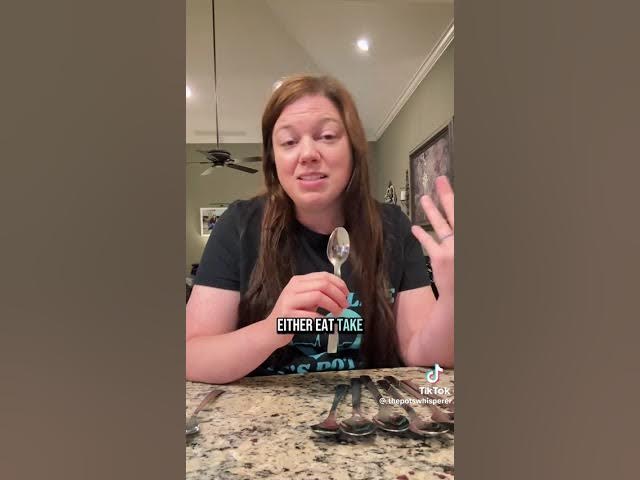Spoon Theory -- The Pots Whisperer
Show More Show Less View Video Transcript
0:00
You might have heard about the spoon
0:01
theory in the chronic illness community,
0:04
but don't really know what it is. So,
0:05
I'm going to explain it to you.
0:08
Everybody wakes up with a different
0:10
amount of spoons each morning, depending
0:12
on your health. These spoons represent
0:15
all of your energy that you have to get
0:18
through the day. And each task you
0:20
complete is going to cost one spoon. A
0:23
healthy person wakes up with more spoons
0:26
than a person who is chronically ill,
0:29
for example. So this person is a healthy
0:32
person and they have six spoons to start
0:36
their day. So for example, waking up in
0:38
the morning and getting dressed is going
0:40
to cost a spoon. Going to work for the
0:43
day is going to cost another spoon.
0:46
Grocery shopping and running errands is
0:48
going to take another spoon. going home,
0:51
cooking supper, and doing laundry is
0:53
going to cost another spoon. Well, this
0:56
person has completed their day and
1:00
they still have two spoons left. So,
1:03
with these two spoons, this person
1:04
decides to meet up with a friend and
1:07
have drinks and save the other spoon for
1:10
a little extra rest for the next day.
1:13
This person had plenty of spoons to get
1:17
through their day. Me, for example, or
1:20
someone who is chronically ill, only
1:22
started the day off with three spoons.
1:26
And my spoons are even smaller than the
1:28
healthy person's spoons.
1:31
Totally not fair.
1:33
Just saying. So, since I only have three
1:36
small spoons to get me through this
1:39
whole day, I have to use them wisely. I
1:43
have to use my three spoons for the most
1:45
important things in my life. So, getting
1:48
up, getting dressed, and bringing my
1:51
kids to school in the morning, it's
1:52
going to cost me a spoon.
1:57
Running errands, and doing housework
2:02
is going to cost me a spoon.
2:07
I have one spoon left. My daughter has
2:09
softball practice, so I'm going to have
2:11
to use my last spoon to bring her to
2:13
softball practice. But, I need to cook
2:15
supper. and I don't have any spoons
2:17
left. So, we can either eat takeout
2:22
again or cereal and milk or
2:26
I can borrow a spoon from the next day.
2:29
That way, I'll have a little bit of
2:31
energy to cook supper for my family. But
2:34
if I borrow this spoon from the next
2:36
day, that means when I wake up the next
2:38
morning, I'm going to be that much more
2:40
tired. I'm gonna be exhausted because
2:43
now
2:44
I only have two spoons to get me through
2:47
the whole entire day. So that's what the
2:49
spoon theory is all about. Healthy
2:51
people have more than enough spoons than
2:54
they need and have enough spoons to do
2:57
the extra things like hanging out with
2:59
friends or enjoying their hobbies. While
3:02
people who are chronically ill only have
3:05
a set number of spoons and most of the
3:07
time it's not enough spoons to even get
3:10
through and do the important things in
3:13
their day. So we don't have extra spoons
3:15
a lot of times to hang out with friends
3:18
or enjoy hobbies. So this was just
3:21
developed as a way to explain how people
3:25
who are chronically ill live their daily
3:27
lives on an energy budget. So when we
3:31
say we can't do something, it's not that
3:33
we don't want to. We just don't have the
3:36
energy. We physically don't have
3:38
anything else left to give.
#Health Conditions
#Mental Health
#Social Issues & Advocacy


